MEHER BABA AND THE MASTS
MEHER BABA AND THE MASTS

A portrait of Meher Baba

A portrait of Meher Baba
In early 1936 Baba started a new phase of his work. Along with a few selected members of the mandali, Baba set off for Rahuri, a town 23 miles from Meherabad where he gathered together a number of mad people and masts (the spiritually intoxicated), upon whom he waited with his own hands. He bathed them, fed them, clothed them, and carefully looked after all their needs. These seemingly strange human “derelicts” were accommodated in special huts and for Baba, the work of looking after these people was extremely exacting. Despite their filthy physical conditions they were spiritually ripe men and Baba chose to do his universal work through them. Work at Rahuri lasted for eight months, until the end of April 1937. There, temporary buildings had been erected along with a hut for Baba and a dispensary where sick people from all over the countryside were treated free of cost.
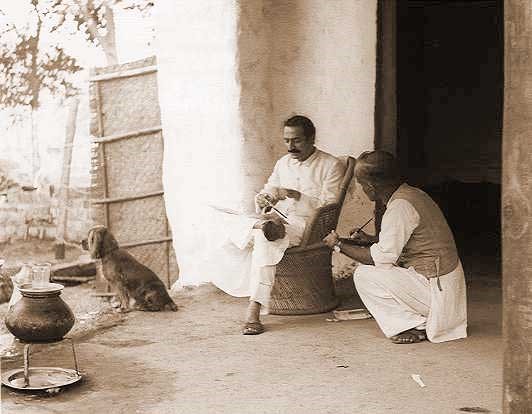
Meher Baba dictating a discourse to Abdul Ghani Munsiff in Rahuri in 1936

Meher Baba dictating a discourse to Abdul Ghani Munsiff in Rahuri in 1936
The men who arrived at the ashram were always restless and at times belligerent; some wanted to leave at once. But after Baba had given them a bath with his own hands, they became composed and settled down at the ashram. During this period, Baba rose at 4:00 a.m. each day and retired at midnight. He served the mad, cleaned out their toilets, bathed them, sat with some of them in seclusion, and, in fact, fulfilled their every whim and fancy. They were given whatever they asked for and were always very well-fed.
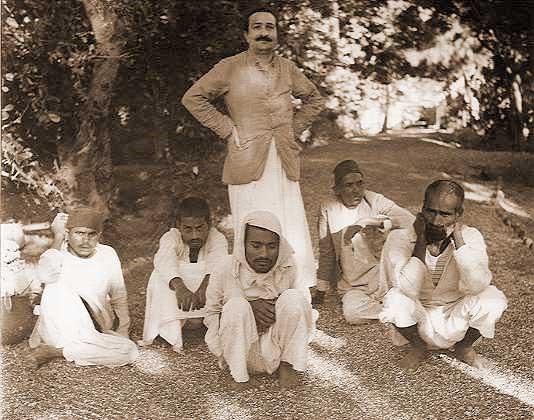
Meher Baba with God-intoxicated souls in Rahuri in 1937

Meher Baba with God-intoxicated souls in Rahuri in 1937
Baba, who did much of his work through the masts, describes them as "those who become permanently unconscious in part or whole of their physical bodies, actions, and surroundings, due to their absorption in their intense love and longing for God. My love for the masts is similar in many ways to that shown by a mother who continues to look lovingly after her children regardless of their behavior."
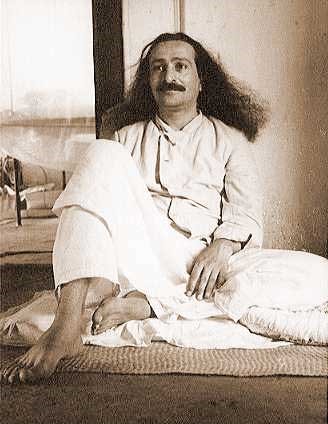
Meher Baba at Meherabad in 1937

Meher Baba at Meherabad in 1937
The men Baba calls 'masts' are not defective in the physiological sense, but they are physically unbalanced. They suffer from nothing that can be called a disease. They are in a state of mental and physical disorder because their minds are overcome by strong spiritual energies overpowering them, forcing them to renounce the world, normal human habits and customs, and civilized society, and to live in dirty surroundings. Baba called them 'God-intoxicated souls.' Baba said that, "they are overcome by an agonizing love for God and are drowned in their ecstasy; only love can reach them." Dhondibua, the mast, when given anything for his material needs, would refuse it saying "I cannot bear comfort!" He would remain naked in all weather, be it in the blazing sun or piercing cold; and when a shirt or blanket was given to him by someone, he would gently but firmly reject the gift explaining that comfort did not agree with him. He would sometimes be seen rolling in the dust. Baba said, “This was from the agony of love for God that the genuine masts have. You cannot have the slightest idea of what such love means — it is an unbelievable agony that continually burns the lover, so that he is but a living fire! This love is a gift from God, whereas God-realization is attained only by the Grace of the Perfect Master. Even these real men of God, the masts, do not all gain God-realization — as a matter of fact, out of very many only one gets it!"

Meher Baba on a horse in Meherabad in 1937

Meher Baba on a horse in Meherabad in 1937
The work of contacting the masts, taking care of them, looking after them, often meant long journeys, sometimes by train, on foot, riding on camels, mules and asses, in bullock carts and tongas, travelling over sand, through jungles, over mountains and most times regardless of food or sleep.
Baba plunged himself into all the hardships that went with his work and his mandali were always at hand to lend their physical support. This work with the masts continued month after month, year after year, with periods of recuperation at Meherabad and intervals of prolonged fasting and seclusion.
Although Baba had started contacting the God-mad in the 1920s, his regular work with the masts started in 1938. The series of mast-tours lasted for nearly nine years covering over 75,000 miles. On these tours, Baba's main object was to contact masts of every kind in all parts of India; he very seldom asked the masts to be brought to him; he almost always went to them. Besides the masts, Baba sought out sadhus and faqirs who had renounced the world and yearned for God-consciousness; but masts remained his main concern.
Between 1939 and 1947, Baba planned and supervised seven main mast ashrams and these were maintained at different places such as Ajmer, Jabalpur, Bangalore, Meherabad, Ranchi, Mahableshwar and Satara.
THE RETREAT
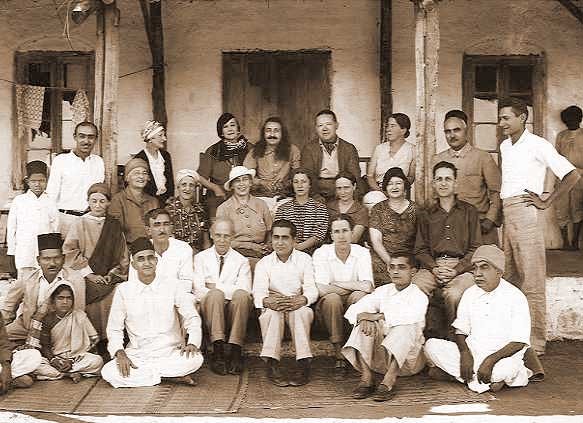
Meher Baba with his Eastern and Western disciples in Meherabad in 1937

Meher Baba with his Eastern and Western disciples in Meherabad in 1937
In October 1936 the mast work came to a temporary halt. Baba’s ninth visit to the West took him to London, Zurich, Paris. His message to the West had taken roots. Now it was time for disciples to come and work and live with him. They would be the initiates. The new ashram at Nasik was ready now. Baba returned in the end of November. In December over twenty disciples came from England and America. To the group that came, Baba directed: "Everyone of you has to help in my work according to your individual capacity; and the extent to which you will remain in the world will be determined by the kind of work which you are destined to perform. I will teach you how to move in the world yet be at all times in inward communication with me as the infinite Being.... As part of your training you will have to experience both the comforts of Nasik and the discomforts of Meherabad."
Nadine Tolstoy, one of the Western disciples, in a letter dated April 1937, wrote from Nasik:
I am writing to you from India. Destiny brought me here — and this destiny is none else but the Will and Grace of Shri Meher Baba.
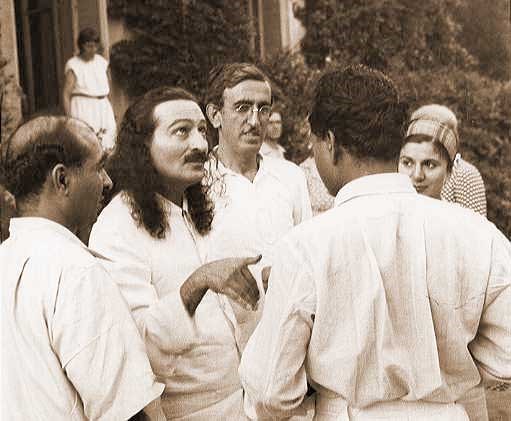
Meher Baba in Cannes in 1937 in conversation with his mandali (close disciples)

Meher Baba in Cannes in 1937 in conversation with his mandali (close disciples)
You can imagine how I felt when I received definite news from Baba, that I am included in the group of westerners who have been called to come to this "Meher Retreat," in Nasik. Here we receive more intensive training under the personal guidance of the Master, to share later in his great universal work.
I know you will understand how much happiness it means to be with the Beloved Master in his home. What a source of great spiritual learning and great spiritual experiences; here we live under his vigilant, all-knowing guidance in the very heart of what is the highest and the purest in this world, surrounded by Love, guided by Love. To him we can bring our deepest sores and problems, to him our hearts are open! He is that Divine Friend who heals all hearts by giving Light and Love with tender patient care as our dearest Mother and Father. In short, with him we are in constant Presence and Love of Christ. Being so close to him we have all the accessible opportunities to witness the unique manifestation of his work.
CELEBRATING THE BELOVED'S BIRTHDAY, 1937
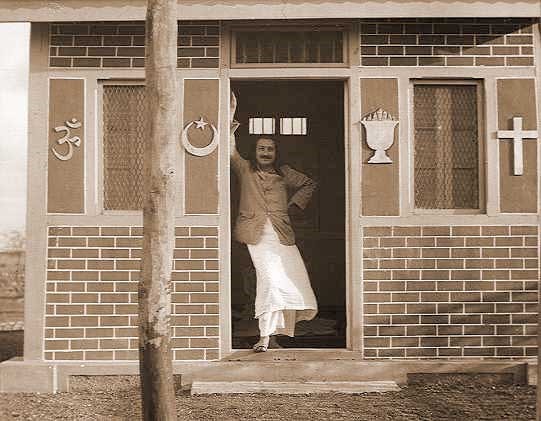
Meher Baba in the doorway of the cabin in Rahuri

Meher Baba in the doorway of the cabin in Rahuri
One of the most memorable experiences of our stay in India was Meher Baba’s birthday celebration, the preparations for which began shortly after our arrival in Decem¬ber. Forty days before the birthday a fast began in which we all shared. The fifteen of us in turn joined Baba in a one-day fast of two cups of tea and two cups of milk. Again, we all participated as he fasted without even water for twenty hours of the day.
Thousands of yards of cloth had been purchased, together with tons of rice and lentils to be made into birthday packages for the poor. The westerners worked at all spare moments tying up these bundles of food, until finally a pyramid of packages, twelve feet high, arose in the midst of the garden. The ashram hummed with activity and by the fifteenth of February the preparations were completed...
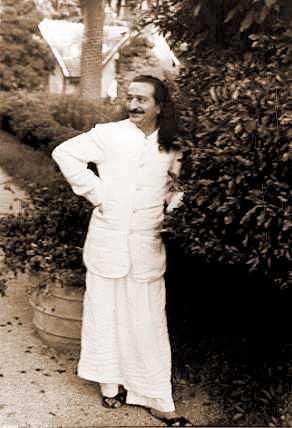
Meher Baba in Cannes in 1937

Meher Baba in Cannes in 1937
During the birthday celebrations ten thousand men, women and children in all stages of poverty and physical need filed past the platform, holding out emaci¬ated hands for food and bundle. Here and there one could see indications in their eyes of a hunger which transcended the physical, as they would come before Baba, bowing their heads to his feet, then looking up into his eyes for a brief moment. As Baba would touch their feet with his sensitive hand, one wondered what measure of his divine love they were able to receive....
Reprinted from AVATAR by Jean Adriel © 1947 by Jean Adriel
After a seven months’ training period at the Nasik Retreat, the group of westerners were asked by Baba to return and prepare for his visit to France, where he would bring a large number of his eastern mandali including one of his chosen masts, Mohammed. On July 31, 1937 Baba sailed for Cannes on the French Riviera. It was the first time that he brought with his party six of his close women disciples to the West. During his stay many Europeans were given an opportunity for an interview with Baba.
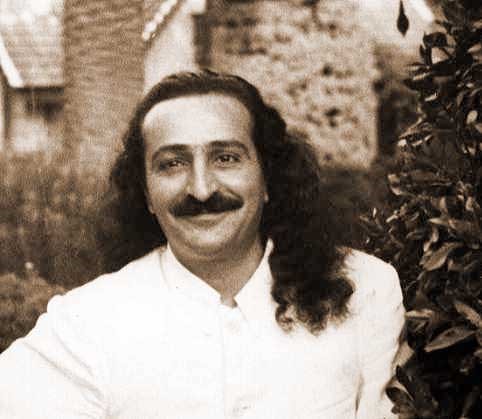
Meher Baba in Cannes in 1937

Meher Baba in Cannes in 1937
During this period Baba and some of his eastern and western disciples went by motor to Paris where they were guests in the apartment of Alfredo and Consuelo Sides overlooking the Seine River. The Paris World Fair was going at that time and Baba encircled it by car without going inside the Fairgrounds. He took his party up the Eiffel Tower. After two days they returned to Cannes. In November 1937, Baba returned to India on the S. S. Circassia.
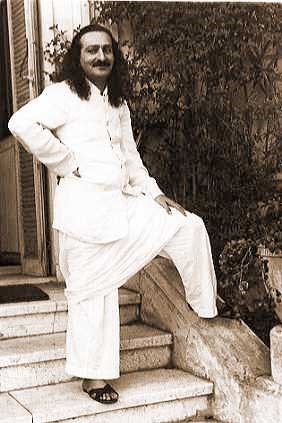
Meher Baba in Cannes in 1937

Meher Baba in Cannes in 1937
He returned to India with three of the women disciples from the West; they were joined by some others later. To give up the freedom they had become accustomed to, to live together without claiming too rigid privacy, to move always within bounds, and above everything else, to do the tasks given by Baba that needed complete concentration — for the westerners it was an entirely new experience. Conflicts would arise, as is natural where personalities are strong, but Baba permitted these discords to develop, confronted those involved in the situation, made them analyze their problems and without compromise or sacrifice brought them together in love. When Meher Baba permitted women to join his ashram, Daulatmai and her daughter Mehera were among the first to come from Poona. Baba told them that they would have to live a very strict and secluded life, wear simple clothes and work hard. Above all they had to obey his orders implicitly.
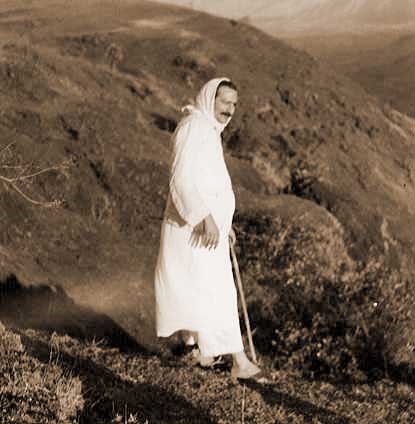
Meher Baba in Meherabad in 1938

Meher Baba in Meherabad in 1938
Mehera J. Irani, later acknowledged as Baba’s chief woman disciple, narrates her first encounter with Babajan. One afternoon during her school recess, her friend Zeena told her: "Let’s go to Babajan. She is a great person and can give you anything you ask for." They found Babajan sitting by the roadside outside the wall of the Convent. Mehera shyly approached Babajan, who asked her, "What is it, my child?" Mehera, without any forethought of what she would say, blurted out, "Babajan, I would like to have a nice white horse." Babajan looked at her, smiled and turning her head sidewards gazed intently up at the sky. Then nodding her head she said, "Very beautiful and fine. All the world will look on him in admiration and love." In reality, Hazrat Babajan had referred to "the White Horse Avatar." Mehera later joined Meher Baba’s ashram in fulfillment of her desire and recognition of Babajan’s boon.

The fully-loaded Blue Bus, photographed in 1939

The fully-loaded Blue Bus, photographed in 1939
In December of 1938 Baba left Meherabad accompanied by men and women disciples in a specially designed bus. Mani S. Irani, Meher Baba's sister, in a letter, dated February 9, 1939, writes on board as what was called the Blue Bus:
AGRA: January 26, 1939 at 8:00 a.m. We went to see the Taj Mahal. We saw everything inside, and the hall where the tombs lay was full of echoes. There we sang one line of the arti (the loud echoes drowning our voices) and Baba told us to stop. He then asked Nadine alone to sing the arti, and she too sang one line. We also saw the masjid near the Taj. But the most amusing time was when we climbed one of the minarets of the Taj groping along the narrow steps in complete darkness, some pushing, some laughing, some singing the arti.... None of us had taken with us a torchlight, and the next day (when it was not necessary) almost every one of us carried one.... We returned home at 10:30.
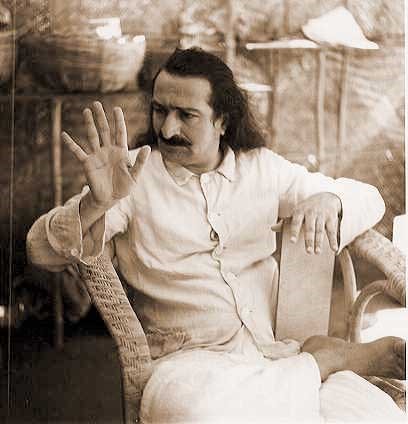
Meher Baba in Bangalore in 1939

Meher Baba in Bangalore in 1939
At 3:15 p.m. we went to the Fort. On entering the Amarsingh Gate, we confronted many ancient buildings in red stone with attractive carvings and we went through all of these. One of them, the Shish Mahal, was really gorgeous. Every time we went into a masjid (Moti Masjid, Nagina Masjid, etc.), we all had to take our shoes off (even Baba took off his sandals!). We got home at 5:20. When in the evening we were discussing it all, Baba said, "I personally liked the Fort better than the Taj. It is perfect in its variety, yet all in harmony." The same evening when, after supper, we all assembled in the room, Baba looked mysterious and said, "Bad news materially, but spiritually zero" (we were told to guess, which we couldn't). Baba then had the newspaper read, which stated that in an earthquake in Chile, South America, 15,000 people were killed. Baba talked on politics, "England and France are weak. They are not firm enough. Now America is strong. The Prime Minister has made a broadcast. He is a thorough gentleman and noble and no match for these rogues (meaning Hitler and Mussolini). The German head is mad. No one but a madman could have done what he did to the Jews. But it all had and has to happen. It is nobody’s fault. It is all just right. It is like a game of chess; they are the figures and I play the game. The last war was not good enough. They were too tired to fight any more and so they made up. But the coming war will remove many factors of mischief and there will be real friendship. I had told our magistrate of Jabalpur that there will be, in six month's time, such riots and floods and earthquakes in India and I told him to tell all the officials there."
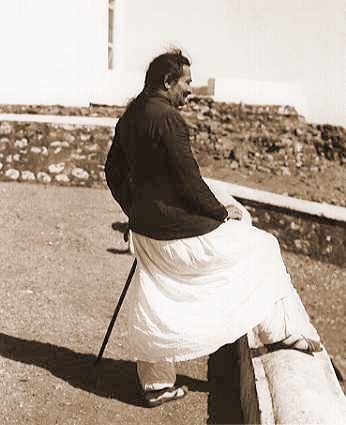
Meher Baba during a stop on the Blue Bus tour in 1939

Meher Baba during a stop on the Blue Bus tour in 1939
Baba then told us how everything had to happen according to law. He gave an example of Kippy; why she should be loved by all and live such a comfortable life while there were so many starving and miserable dogs. He said, “God is not kind; He is an ocean of mercy. But it is all according to law. And law is not complicated: it is simple; you sow a seed, you water it; you have a plant, it grows, it is so simple. Law gives you all this from one seed because all this was latent in the seed. Law deals individually and also in multitudes of the same type. Your taking birth at a certain time, your giving up body at a certain time is all according to law which shapes your actions. You are not responsible. But what about those who all die at one and the same moment like thousands in an earthquake? Law gathers all of the similar types in one country and ends it in one time. When the plant grows into a big tree, it is not conscious of it, not responsible, but law shapes it, brings out of it what is there. When you were a baby, you were not conscious how you grew up.

Meher Baba caring for Mohammed, the mast (God-intoxicated)

Meher Baba caring for Mohammed, the mast (God-intoxicated)
"It is so natural because law does it. From childhood to old age you feel the same yourself, only when you look in the mirror you know it, and most of the time you forget you have become old. This law so establishes itself, there is no escape. It grows into a habit which can never be shaken off. Law asserts itself as soon as you are born. The puppy does not open its eyes when it is born. It feels hungry and searches for mother’s milk. Law's grip is eternal till you go beyond law, then you are free. Shams says, 'You think binding to a Master is binding and all life is free to do what you like; but you are bound by hunger, sleep, etc. and have the body-binding, the greatest binding. But this one binding of faith and love to the Master is sure to free you from all universal bindings.' Being good is a good binding. You must either be good or bad. Bad is like bound wrists. Good is like bound feet. Kabir writes beautifully about this, 'Good keeps your hands free so that you can even unbind your feet.' Be good. It pays! Bad makes you mad. Good takes you to God, and the best way to become good is to serve others and try to make others happy. The climax of good is loving. Bad is anger, getting excited; good is forgiving. Biting is bad, but to be bit is good. If you offer your cheek, knowing you could easily wring their neck, that is excellent."

Meher Baba and Baidul bathe a mast in Bangalore in 1939

Meher Baba and Baidul bathe a mast in Bangalore in 1939
Fifteen large towns were visited. This tour of India lasted five months until May of 1939. During the tour, a number of men disciples would go ahead by train to look for accommodations and arrangements in all the towns visited. Baba planned a visit for those accompanying him to Mathura, where Krishna was born and to Brindaban, which was the scene of Krishna's childhood, where he had woven around the gopis and cowherds the magic of his love and playfulness with the melody of his flute. As Baba and his disciples approached the river at Brindaban, a young man was seen sitting on the wall, playing a flute; when he noticed Baba he stopped and in a loud voice cried out: "Here comes the Flute Player" (which is another name for Krishna). He did not ask for anything but just ran ahead of Baba and began to dance to the music of his own flute. The guide thought Baba was being bothered and tried to drive the man away with a stick. Baba said: 'Let him be'. The young man kept on following Baba, shouting loudly, happily, "Krishna is here! Krishna is here!" Then it was time to return to the bus. Baba and the man greeted each other for the last time — there was an unmistakable sign of recognition written on his face. On the way back his followers asked him who the young man really was. Baba told them that he had come for this man who was a spiritually mature soul.
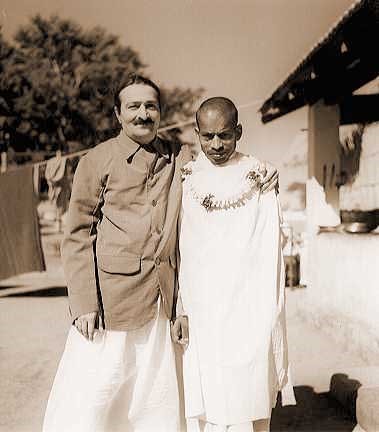
Meher Baba with mast Mohammed in Bangalore

Meher Baba with mast Mohammed in Bangalore
While Baba worked with the masts at Bangalore, he also proposed establishing an International Spiritual Centre. This Centre would be at Byramangala some twenty-two miles from Bangalore. Baba wanted this Centre to accommodate two thousand people of all religions, with six departments: The Spiritual Academy, with the aim of preparation for international harmony; The House of Advanced Souls, for practical mysticism; The Abode of the Saints, for those who would teach of the Reality of God; The Mast Department, for the God-intoxicated; The Department of Meditation, for those who wished to practice meditation, under guidance; The Resting Place for the Afflicted, for the care and alleviation of suffering of all kinds. The plans for the Centre were abandoned at the start of the Second World War.
Baba had worked with the masts for a considerably long period. He dissolved the Bangalore mast ashram and returned to Meherabad in April 1940. For most of Baba's western lovers who stayed with him in Bangalore in 1939-40, the period was one of happiness, constant activity and close proximity with their Beloved. Dr. William Donkin records in his diary on February 19,1940:
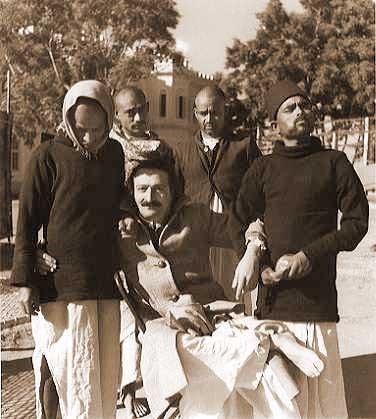
Meher Baba with a few God-intoxicated souls in Bangalore

Meher Baba with a few God-intoxicated souls in Bangalore
"Baba was looking radiantly noble, with hair let down and really glistening. He was a fine sight to look at, his phenomenal strength of character and his sort of mysterious spiritual beauty and radiance very much visible as he sat on his couch. Baba’s face in repose is such a fusion of spiritual bliss and serenity, yet such sadness, which gives dignity and grandeur to the face."
In Meherabad, Baba immediately resumed his work with the masts. For the first few days he would come to bathe them at 5:30 in the morning. But war had started and his own work took on the stress of the emergency. Now his work with the masts started soon after midnight. Apart from this work, the rest of the time he spent in seclusion.
Upasni Maharaj during the last few years used to say that he earnestly wanted to see Meher Baba. On hearing such oft-repeated requests, Meher Baba told Gulmai that he would see Maharaj alone and only once. It was their last meeting on the evening of October 17. On Christmas eve, December 24, 1941, at 3:30 a.m., Maharaj, who was in his seventy-first year, passed on.
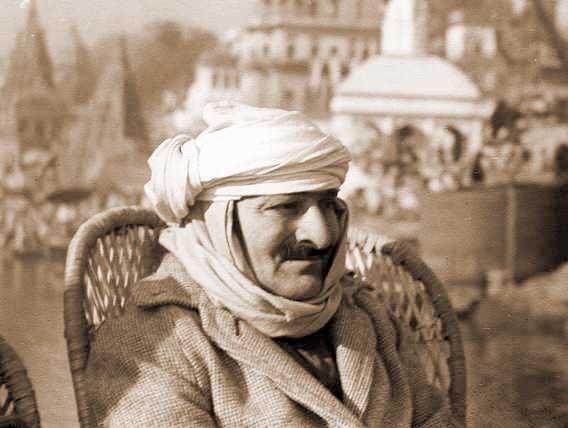
Meher Baba in Varanasi during the Blue Bus tour

Meher Baba in Varanasi during the Blue Bus tour
During the sahavas (love-gathering) of 1954, Meher Baba told his lovers, "Only Maharaj and Babajan directly played the main roles. Babajan, in less than a millionth of a second, made me realize that I am God; and in the period of seven years Upasni Maharaj gave me the Divine Knowledge that I am the Avatar. Before Maharaj dropped his body, we physically met in a secluded place. And before I drop my body, I had to meet him, so I went to Sakori and bowed down to his shrine and told him, 'You know I am the Ancient One'. Maharaj was perfection personified."
SIGNIFICANCE OF THE WAR
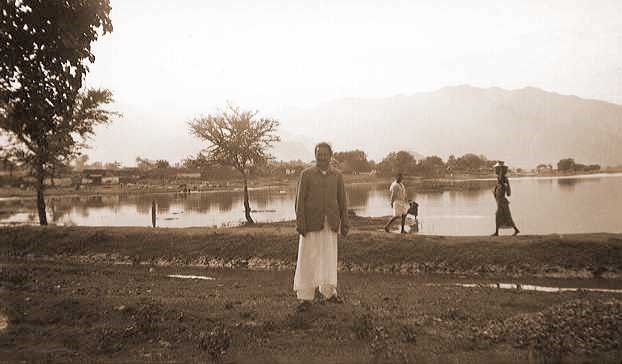
Meher Baba photographed while traveling

Meher Baba photographed while traveling
In 1941 the mast ashram was closed down suddenly and completely. The War had entered the third year. Japan was driving her forces into India’s eastern border. Baba issued a message on the ‘Spiritual Significance of the War’ in March 1942. He said: “War-effort will be justified or stand condemned not by the results which it produces, but by the ends by which it is inspired. The world has to face this war and go through its ordeal of fire, even at the cost of irreparable damage and irredeemable suffering; it is a necessary evil....
"Humanity has to emerge out of this dreadful war with spiritual integrity, with hearts free from the poison of malice or revenge, with minds disburdened of the blows given or received, with souls unscathed by suffering and filled with the spirit of unconditional surrender to the Divine Will. In spite of its attendant evils, this war plays its part in my mission of helping humanity to fulfill the divine plan on earth and to inherit the coming era of truth and love, of peace and universal brotherhood, of spiritual understanding and unbounded creativity."

Meher Baba with his Eastern and Western disciples in Goa

Meher Baba with his Eastern and Western disciples in Goa
He gave the following explicit instructions to all his disciples:
1) They should be above party politics and should bear malice and ill-will towards none.
2) They should observe all the precautionary measures of war for civil population enforced by the Government of the day.
3) They should continue as usual to discharge their special duties and work for Baba’s spiritual cause unless otherwise directed by him.
4) They should stick to their posts and appointments anywhere in India, under any circumstances, unless ordered by the Government.
5) They may undertake humanitarian and relief work of a nonsectarian character, without identifying themselves with any party or political organization, and strictly within the scope of time and leisure left over after the performance of spiritual duties enjoined by him.
6) They should extend spiritual solace and comfort to the people within the area of their contacts and influence, with a view to counteracting the panicky states of their minds.
7) Exceptional cases and circumstances, requiring readjustment of routine lives, could be communicated to him.
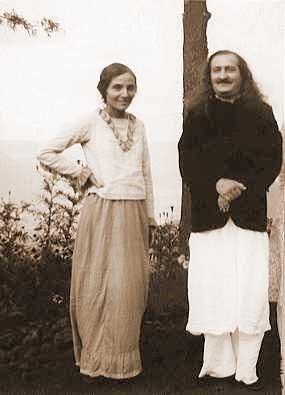
Meher Baba with Mehera J. Irani, his chief woman disciple

Meher Baba with Mehera J. Irani, his chief woman disciple
In October of 1943, Baba and a large group of disciples visited Calcutta during the terrible famine of that year, when thousands died of hunger. On an earlier visit to Calcutta in June 1940, Baba met Karim Baba, a sixth plane jalali mast. The mandali named him the ‘tiger man’, for he had long nails and skeins of steel wire round his throat. His hair and beard were thick, black, dirty and matted. Despite the filth, his face shone and there was fire in his eyes. The mast was taken to Ranchi where Baba fed him several times a day and sat alone with him.
During this visit, Baba fed about a thousand people, organized the distribution of about ten thousand chapaties (baked bread) and distributed vests to two thousand children. Some middle class people who were invited to the feast organized at the Puddopukkur Relief Centre could not ask for charitable relief because of their social position.
When all were seated in the school building where the feast was being given, some of the orthodox Hindus were disconcerted at being served by a non-Hindu, i.e. by Baba, whose identity as Meher Baba was kept secret. However, the social workers of Calcutta who had helped organize the feast explained to the guests that these people (Baba and his disciples) had come all the way from Bombay to serve them, and that they should be grateful. Nearly all accepted this generosity and were even struck by the fact that the originator of the charity had himself come to serve them and supervise the work. When the feast was over, Baba personally gave each person clothes and money.
THE ROMANCE OF MEHER BABA AND THE MASTS
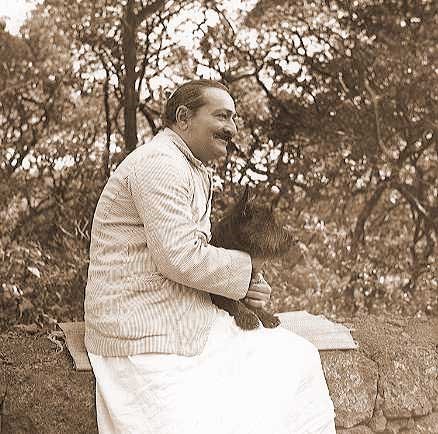
Meher Baba with Cracker in Mahableshwar in 1946

Meher Baba with Cracker in Mahableshwar in 1946
The romance of Meher Baba and the masts forms the basis of a magnificent book The Wayfarers by Dr. William Donkin. The material is fascinating and here I mention some of the glimpses. Mian Saheb was a very spiritually advanced mast who lived in Ajanta. It was believed that he was over one hundred years old and deeply respected in Ajanta. People gave him whatever he asked for and a local businessman had given him a garden. In November, 1944, Baba drove over to Ajanta from Aurangabad. When the party arrived one of the group proposed a meeting with Baba, and Mian Saheb suggested the use of a room on the upper floor of a certain house. Baba and the mast climbed to the room on the upper floor and were there for some time. Mian Saheb invited Baba to sit upon a sofa and then sat next to Baba and embraced him very lovingly. Then he started weeping loudly. Those waiting below could hear the mast weeping. The mast’s tear-slurred voice recited a Persian couplet, "Khud be Khud azad budi, khud gireftar amadi”; which means in free translation, “You became free, and then allowed yourself to be bound." The allusion was clear; he was talking of Baba’s Infinite State, and how he became bound of his own will to help humanity.
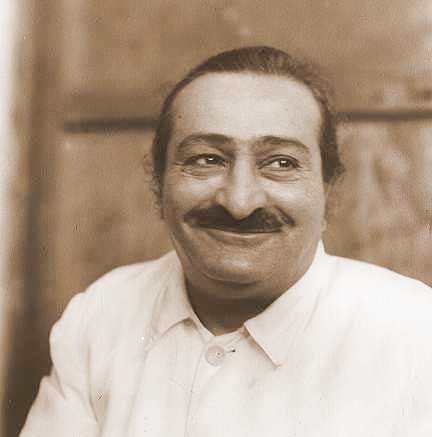
Meher Baba in Ahmednagar in 1945

Meher Baba in Ahmednagar in 1945
A greater part of 1945 was spent in Hyderabad where Baba contacted a large number of masts. One such important contact made in the summer of that year is described as follows: "The spiritual chargeman of Hyderabad is Sayyed Moeinuddin (also called Majzoob Mian), a majzoob-like mast of the sixth plane, and typically jalali (fiery). He is a lame, elderly man who lives in a woodstall at the Fateh Gate in Hyderabad. He sweeps the road with his hands, is very fond of barfi (a sweetmeat), and he smokes exclusively an atrocious brand of cheap, local cigarettes. Because of his jalali nature, he was never easy to contact, and at the first attempt to meet him, Baba and his group were repulsed with epithets. Later after much resistance Baba contacted him successfully nearly four times in different situations.
Baba contacted a large number of spiritually advanced masts in 1946 who acknowledged Baba’s spiritual greatness, despite the fact that he contacted them incognito and they had no tangible means of knowing who Baba was. Aghori Baba, a sixth plane mast of Simla when contacted in August, spoke, pointing to Baba and addressing those around him, "You will see what will come to pass, and one day you will know who he (Baba) really is. When Baba contacted Azim Khan Baba on October 14, 1946, the mast said, "You are Allah; you have brought forth the creation, and once in a thousand years you come down to see the play of what you have created."
The same month, Pir Fazl Shah, an adept pilgrim of Kotah told Baba, "No one, until you came, has touched my heart with the arrow of Divine Love. You have the power to destroy and flood the whole world. No one fully knows the limits of your greatness; you are the spiritual authority of the time and if I were to die I would take another body to be close to you."
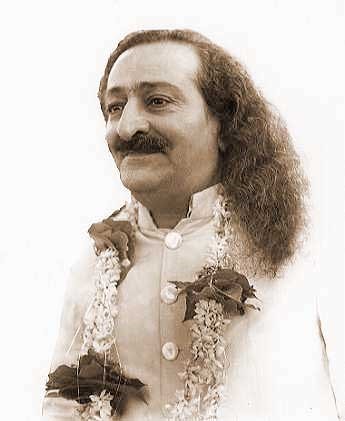
Meher Baba in Ahmednagar in 1945

Meher Baba in Ahmednagar in 1945
Once again in August of 1947 Baba toured Hyderabad extensively, contacted a large number of important masts, returned by the end of the same month and went into seclusion in a cabin built on the summit of a small hill called Tembi, near Meherazad. On the evening of December 5, 1947, Baba went into seclusion on Tembi Hill, behind Meherazad. Two small huts of cement asbestos sheeting had been erected - one on the summit of the hill and the other on a lower shoulder of the hill. Ali Shah, a mast, was brought to Baba on this hill and he stayed in the lower of the two huts. Each morning from December 6 to 17, Baba sat with him in the lower hut from 6 a.m. to 9 a.m.
For Baba the year 1948 was another year of hectic activities with masts and a significant visit to Allahabad to the Kumbh Mela where Baba contacted and touched the feet of 4,000 sadhus, among whom, he said, there were but seven advanced souls. On New Year's Day in 1949 Baba sent the following circular from Meherazad: "All men and women who believe in me should observe silence for one full month in July 1949. All disciples and devotees to be more engrossed in God than in Maya by being less selfish and more sacrificing. The year 1949 marks an artificial end to an artificial beginning and the real beginning to the real end. Although I am in everyone and in everything and my work is for the spiritual awakening of all mankind, I am always aloof from politics of any kind. My disciples and devotees should continue as before to abstain from taking part in political activities and discussions."
From June 22 to July 31, 1949, Baba entered into forty days of seclusion at Meherazad. There had been many periods of seclusion in Baba's life, some for long periods, but this was known as the "Great Seclusion" because of the tremendous work Baba accomplished.